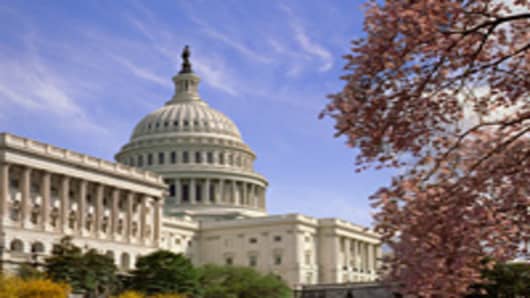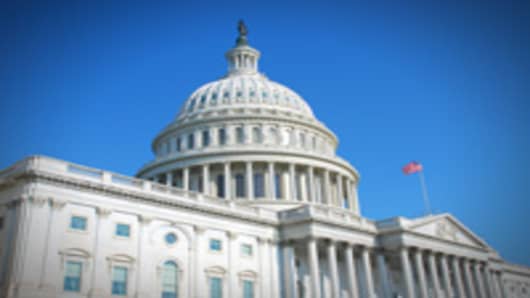The deficit-reduction supercommittee failed to go big or even small. But it did succeed in conducting virtually all of its negotiations in private.
The bipartisan congressional panel held just a handful of open sessions over the past three months despite the impact a $1.2 trillion debt-cutting package would have had on the American public.
The real meat of the supercommittee's work—arguments and give-and-take proposals over the future shape of politically sensitive entitlement programs such as Medicare and Medicaid, whether to increase taxes on the wealthy, and who knows what else—took place behind closed doors.
The public got an occasional glimpse of offers and counteroffers through leaks to reporters, but often only several days after they were made and rejected.
Anyone looking for internal records created by the Joint Select Committee on Deficit Reduction is probably in for a very long wait. Unless the committee decides proactively to release email exchanges among members or copies of draft proposals, these and other documents will remain under seal for 20 years, according to the supercommittee's rules.
Surprised? Don't be.
This is Congress, after all, an institution that preaches transparency but practices opacity. Lawmakers with authority to subpoena records from federal agencies have exempted their own offices from the Freedom of Information Act, the nation's preeminent open records law. And reams of information about the activities of dozens of committees, subcommittees and caucuses have yet to be transformed into electronic digits and made available on the Internet.
The supercommittee's purpose was to forge an unprecedented legislative package in the quest to cut the deficit. Media coverage was intense as members scrambled, and ultimately failed, to meet a deadline to avoid automatic spending cuts. All the attention may have left the impression that the bargaining among the panel's 12 members—three from each party in the House and Senate—was being done in the open.
But in reality, the supercommittee held just five public hearings since being formed in August in the wake of failed attempts by Republicans and Democrats to find a "grand bargain" to stem the flow of federal red ink. The first open session was held Sept. 8, according to information posted on the committee's website. It lasted less than an hour and no specific proposals were debated. Virtually all of the substantive conversations over what might go into the debt-cutting package took place out of the public's view.
The secrecy was infectious on a variety of Washington interests, including the agriculture lobby, which is currently enjoying an economic boom but worried about the fate of generous farm subsidies Congress has authorized for years. With most farm programs up for renewal in 2012, farm-state members bargained that they could fold a five-year farm bill worth hundreds of billions of dollars into the supercommittee's bill and avoid major cuts.
The leaders of the House and Senate Agriculture committees came close to agreement on a plan that would have saved $23 billion on paper, but could have maintained farm incomes at a nearly four-decade high and even increased certain subsidies. The supercommittee's collapse means the committee leaders probably will have to push the bill through the regular legislative process next year and potentially face much deeper cuts.
Advocates of open government criticized the supercommittee's approach. With the panel operating in seclusion, no one could be sure where its ideas came from and what the motivating forces behind them were. What role did lobbyists and special interest groups play behind the scenes? Fundamental shifts in American law and policy might have emerged from what John Wonderlich of the Sunlight Foundation dubbed a "legislative black box."
The preference for privacy was evident from the start.
The subcommittee's rules stated the panel's meetings would be open unless it voted during an open session to close them. But at the Sept. 8 session, supercommittee members decided the term "meeting" would apply only to a gathering for the actual transaction of business, such as a vote. Less formal "working sessions" would not be covered by the open meeting rule.
Based on that interpretation, the bulk of the supercommittee's deliberations could take place privately, said Michael Stern, former House senior counsel and author of the blog Point of Order.
Wonderlich, the Sunlight Foundation's policy director, called the committee's interpretation of the open meeting rule "ridiculous."
"I'm not going to pretend that normal committees are a perfect window into the negotiations of Congress, but at a minimum we get to see proposals before they are voted on and then shuttled off to the floor of the House," he said.
According to the panel's rules, records generated by the supercommittee would remain closed for 20 years unless the committee adopted a resolution authorizing public access at an earlier time. "I would not expect that to happen unless there is an outside force prompting them to do it," Stern said.
Steven Aftergood, director of the Project on Government Secrecy at the Federation of American Scientists, said the panel's records rule is rooted in a congressional resolution passed in the late 1970s. The resolution is a "relic of another era," Aftergood said. "In most cases it no longer makes good policy sense. In the case of the deficit supercommittee, it is one more sign of a broken process."



